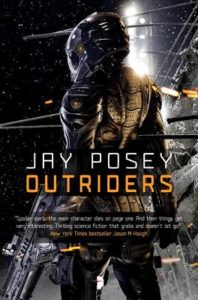Tim Recommends a Book 001: Outriders by Jay Posey
Let me start by saying that this is a military sf novel. If that’s not your thing, if you don’t enjoy books about competent people doing difficult things in the face of overwhelming odds with honor and heroism, then I must withdraw my recommendation. However, I think it’s still a good book to discuss from a craft perspective because there are some strange bits to it that shouldn’t work and yet totally, totally work. It’s an interesting study.
Posey, btw, is a game writer. He works for Red Storm, which is Tom Clancy’s outfit. I’ve never played any of their games, but he does namecheck Richard Dansky in the credits. Dansky’s the man who gave me my first writing job back in college while he was at White Wolf. I picked up this book because I was interested in seeing how a game writer approached novels, especially a novel that was theoretically in line with the games he helps create.
What caught my attention about the book was its structure. In a lot of ways, it took a very long time for anything to actually happen. We’re given two perspectives; our protagonist, a man by the name of Lincoln Suh, as he is recruited for a special super secret ninjacorps intelligence division in the UAF (United American Federation) military. (As a double aside, the UAF’s closest allies are Iran and India, which I thought was some nice outside the box thinking). A good deal of the early part of the book is Suh meeting his teammates, learning what these ninjas do and how they do it, and getting introduced to the very special technology that they use. This is maybe a third of the book.
In our other perspective, we’re given snippets of the problem our ninjacorps is going to have to solve. It’s only a few chapters of action and the shadowy implication of who might be behind it. It’s a lot of disparate threads, and while I knew they were going to connect at some point, it felt a little frustrating. Finally, at one point I put the book down, turned to my wife and said “This is a very slow book.”
Then I looked down and saw that I had just torn through ~150 pages without noticing. That’s the key. Posey wrote these characters so well, with such insight into their motivations and interactions, that I was ripping through it. Nothing was actually happening, but a lot of stuff was happening, and it all kept my attention and made me more and more invested in the story. So when we finally get to things actually happening I was on full burn and coming in hot.
The lesson: Good writing can overcome bad structure, but good structure can never save bad writing.
I will say that the book maybe could have ended a few chapters early. There’s the build up, the confrontation, the moment of darkness, the solution and the victory. They spend 420 pages planning and executing a single operation, and then 16 planning and executing a second so they can have a brief encounter with the behind the scenes bad guy. And the reveal there is good, but I thought it could have been built up a little better. Who and what this person is is kind of critical to the world, but I don’t remember there being a single mention of them or their organization or the things that led to their formation in the rest of the book. We have fewer than 20 pages to go “Oh no! It’s not… it couldn’t be… IT IS!” which isn’t enough.
That said, a very good book. Buy it, read it, enjoy it.
p.s. Instead of going the obvious route and linking to an Amazon associate’s page up, I’m going to be using Indiebound. Maybe you can show your appreciation for my forward thinking policy by, you know, recommending my book to your friends. Thanks!
